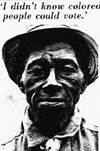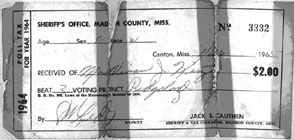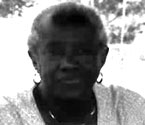Voter Registration and the Mississippi Freedom Democratic Party
The
Tougaloo College Archives provide rich resources for studying the struggle to register African Americans to
vote in Mississippi.
 A wealth of documents tell the story of how a determined group of people from
Mississippi and from outside the state, both black and non-black, and of all ages transformed the
fundamental political structure of Mississippi through grassroots organizing and through direct public
challenges to a system founded on, and governed by, the belief and practice of white supremacy. Since at
the least 1890, when its constitution was ratified, the state of Mississippi had instituted legislative
measures to prevent blacks from participating in the electoral process. These measures included the payment
of a poll tax, the use of a literacy test, and the requirement that voters provide a verbal and/or written
interpretation of the state constitution. In addition to legal actions taken to disfranchise Mississippi's
black citizens, white registrars regularly found reasons not to allow blacks to register to vote. When such
actions failed to dissuade black men and women from attempting to register, reprisals against them often
came in the form of economic and physical intimidation, as well as outright violence.
A wealth of documents tell the story of how a determined group of people from
Mississippi and from outside the state, both black and non-black, and of all ages transformed the
fundamental political structure of Mississippi through grassroots organizing and through direct public
challenges to a system founded on, and governed by, the belief and practice of white supremacy. Since at
the least 1890, when its constitution was ratified, the state of Mississippi had instituted legislative
measures to prevent blacks from participating in the electoral process. These measures included the payment
of a poll tax, the use of a literacy test, and the requirement that voters provide a verbal and/or written
interpretation of the state constitution. In addition to legal actions taken to disfranchise Mississippi's
black citizens, white registrars regularly found reasons not to allow blacks to register to vote. When such
actions failed to dissuade black men and women from attempting to register, reprisals against them often
came in the form of economic and physical intimidation, as well as outright violence.
Prior to the 1960s many individual black Mississippians, nonetheless, asserted their rights as United States citizens and while most were denied the franchise, a few slipped through Mississippi's form of political apartheid. It wasn't until 1961, however, that a wholesale movement to register black voters emerged from the ashes of the Freedom Rides, which had ended in Jackson, Mississippi in May of that year. The 300 young men and women from the Student Non-Violent Coordinating Committee (SNCC) and the Congress of Racial Equality (CORE) present in the state because of jail sentences stemming from their challenges to Mississippi's segregated public accommodations, formed the basis for a voter registration campaign.
Members of SNCC established an office in Jackson and debated the best way to aid black Mississippians.
Some argued for further direct action, like the sit-ins and Freedom Rides, while others advocated a voter
registration campaign targeting individual communities which denied blacks the right to register.
 Such a
campaign would mean going into all parts of Mississippi, because blacks were disfranchised in every section
of the state. (Historian John Dittmer writes that 'of the more than 13,000 blacks eligible to vote [in
Sunflower County], fewer than 200 were on the books' in 1962.)
Many in SNCC soon recognized that attempting
to register black voters in Mississippi was a form of direct action protest, possessing the same, if not
greater, dangers as the sit-ins and freedom rides. During the years of 1961 through 1963 a small band of
men, women, and children from such civil rights organizations as SNCC, CORE, and the National Association
for the Advancement of Colored People (NAACP) began a campaign that sought not only to register black
Mississippians to vote, but to create a base of local people who would serve their communities as leaders in
the political transformation of the state. Freedom Summer, launched in 1964, under the auspices of the
federally sponsored Voter Education Project (VEP), the Council of Federated Organizations (COFO), an
umbrella organization for the various civil rights groups in Mississippi, was a massive voter registration
project within Mississippi. Freedom Summer brought hundreds of white students from elite colleges and
universities throughout the U.S. into black communities and into predominately black-run organizations.
Such an influx brought both problems and national attention. And, perhaps most importantly, Freedom Summer
brought much needed resources, both human and economic, to a campaign that had faced devastating levels of
brutality and demoralization. Another legacy was that a coalition of local activists came together to
challenge the political structure of Mississippi in a domain connected to, yet superseding, grassroots voter
registration projects.
Such a
campaign would mean going into all parts of Mississippi, because blacks were disfranchised in every section
of the state. (Historian John Dittmer writes that 'of the more than 13,000 blacks eligible to vote [in
Sunflower County], fewer than 200 were on the books' in 1962.)
Many in SNCC soon recognized that attempting
to register black voters in Mississippi was a form of direct action protest, possessing the same, if not
greater, dangers as the sit-ins and freedom rides. During the years of 1961 through 1963 a small band of
men, women, and children from such civil rights organizations as SNCC, CORE, and the National Association
for the Advancement of Colored People (NAACP) began a campaign that sought not only to register black
Mississippians to vote, but to create a base of local people who would serve their communities as leaders in
the political transformation of the state. Freedom Summer, launched in 1964, under the auspices of the
federally sponsored Voter Education Project (VEP), the Council of Federated Organizations (COFO), an
umbrella organization for the various civil rights groups in Mississippi, was a massive voter registration
project within Mississippi. Freedom Summer brought hundreds of white students from elite colleges and
universities throughout the U.S. into black communities and into predominately black-run organizations.
Such an influx brought both problems and national attention. And, perhaps most importantly, Freedom Summer
brought much needed resources, both human and economic, to a campaign that had faced devastating levels of
brutality and demoralization. Another legacy was that a coalition of local activists came together to
challenge the political structure of Mississippi in a domain connected to, yet superseding, grassroots voter
registration projects.
By the fall of 1963, the Mississippi Freedom Democratic Party (MFDP) had come together (in part as a
result of the efforts of COFO) and sought to attend the Democratic National Convention of 1964, which was to
be held in Atlantic City, New Jersey. Frustrated by the unwillingness of Mississippi's traditional
Democratic Party to fairly and adequately represent all of the state's residents (who were mostly black),
the MFDP wanted to challenge the 'Regulars' at the convention for three reasons
 : 1) the systematic exclusion
of blacks from equal participation in state politics, 2) the disloyalty of the Mississippi Democrats to the
national party, and 3) Mississippi's willingness to uphold the unequal, unfair status quo.
: 1) the systematic exclusion
of blacks from equal participation in state politics, 2) the disloyalty of the Mississippi Democrats to the
national party, and 3) Mississippi's willingness to uphold the unequal, unfair status quo.
Civil Rights Movement activists believed that the inability of blacks to participate in a constitutionally mandated political process like voting denied blacks the opportunity to change the society of which they were a part, a society full of inequality, racism, and dire poverty. Therefore, the MFDP staged a mock election the summer before the convention in order to encourage black Mississippians to register to vote despite various intimidation tactics by the white ruling classes. To do this, Voting/Elections Schools were established across the state, which prepared eligible voters for voter registration by teaching them how to read and interpret various parts of the Mississippi Constitution, write their names, and fill out the registration materials. While many activists debated the effectiveness of a mock election, 80,000 blacks participated in the November 1963 Freedom Vote which elected the MFDP delegates to the national convention.
Upon arriving to the convention in 1964, the MFDP gained national attention when Mrs. Fannie Lou Hamer
spoke before the Democratic Credentials Committee, pleading for the seating of the MFDP as Mississippi's
delegates instead of those from the traditional party. The appearance of the MFDP at the convention meant
trouble for President Lyndon B. Johnson, who was to be the 1964 Democratic Presidential nominee. Johnson
was aware of the unconstitutional voting practices in Mississippi but could not risk seating MFDP delegates
at the expense of Mississippi Regulars, since to do so could have meant a Southern Democratic walkout.
Alabama delegates had walked out of the convention in 1948 when Democratic Presidential Nominee Truman
 pledged a Civil Rights platform. With the advice of Johnson and Vice Presidential hopeful, Hubert Humphrey
of Minnesota, the Credentials Committee issued a compromise allowing only two of the MFDP delegates to
receive voting privileges and the others to be honored guests. The MFDP delegation rejected the compromise,
unhappy that the national party remained more concerned about national politics than about the lives of
black Mississippians. Despite the disappointment of not being recognized at the National Convention, the
MFDP had brought national recognition to the importance of the black vote and thus played a role in the
passing of the Voting Rights Act of 1965.
pledged a Civil Rights platform. With the advice of Johnson and Vice Presidential hopeful, Hubert Humphrey
of Minnesota, the Credentials Committee issued a compromise allowing only two of the MFDP delegates to
receive voting privileges and the others to be honored guests. The MFDP delegation rejected the compromise,
unhappy that the national party remained more concerned about national politics than about the lives of
black Mississippians. Despite the disappointment of not being recognized at the National Convention, the
MFDP had brought national recognition to the importance of the black vote and thus played a role in the
passing of the Voting Rights Act of 1965.

|
Related Documents
Letter, Aaron Henry to United States Attorney General John M. Mitchell, 30 June 1971Poll tax receipt, Madison County, Mississippi, 1965
MFDP flyer endorsing Aaron Henry for senator, 1964
Advertisment, Student Nonviolent Coordinating Committee, 1964
* Blackwell video by Indira Stewart (Brown '02), assited by Danny Stoltzman (Brown '02).